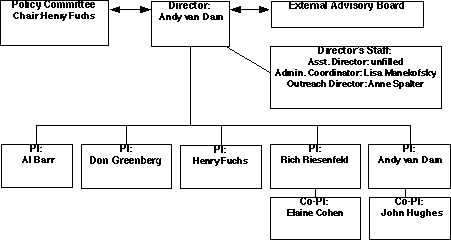
As indicated in the figure below, the Center is governed by a Director, who functions as Chief Executive Officer. At the end of Year 5, the directorship transferred from the founding Director, Don Greenberg to Andries van Dam, the present Director. The Director executes policy devised by a Policy Committee, in accordance with the Center's long-term strategic plan. The Policy Committee also elects the Director. During the Center's initial six years the Director was supported by a Chief Financial Officer and a Chief Operations Officer. The CFO position remains intact and is held by Rich Riesenfeld. The COO position has been subsumed by the Director's Staff which consists of the Assistant Director (currently an unfilled position), the Outreach Director, and the Administrative Coordinator. The Director is advised by an External Advisory Group.
The following sections contain the Center's governing rules.

The Director is:
The Policy Committee is a governing board, composed of the five Center Principal Investigators, that:
Policy Committee decisions are by majority vote except for issues of fundamental importance, which require four out of five. Issues of fundamental importance include accepting new vendor sponsors and adding or removing sites. Two out of five votes can raise an issue to the status of fundamental importance.
To assist the Director as CEO with administrative tasks, the Policy Committee appoints a Chief Financial Officer. (The financial home of the Center is expected to remain at Utah, and therefore the Chief Financial Officer is expected to be the PI at Utah.)
The Director's Staff consists of the Assistant Director, the Outreach Director, and the Administrative Coordinator. The Assistant Director assists the Director in the overall operation of the Center. The Assistant Director also develops research programs and upper-level education programs. The Outreach Coordinator is responsible for the Center's outreach strategy. The Administrative Coordinator performs and oversees administrative tasks, maintains Center records and organizes special events (such as External Advisory Group meetings).
The External Advisory Committee consists of representatives from selected national research laboratories, academia, and the computer industry. Its role and responsibility is to critique research progress, provide recommendations on internal proposals for funding from the Director's pool, provide critical information regarding industry and application needs and advances in key technologies, advise on hardware/software developments and technology transfer opportunities, and influence general directions of the Center. It also counsels as to the necessity of, demand for, and feasibility of the ongoing reported research projects, as well as reports to the Center participants about new key manufacturing and design technology. It meets at least twice a year and provides feedback, especially to the Director, throughout the year.
It is the responsibility of the PI at each site to allocate research funds and, where applicable, administrative and outreach funds, in consonance with the strategic plan.
To provide long-term stability, continuity and critical mass at each site, each site is allocated a baseline sufficient to support at least one month of faculty time and one FTE research staff member who functions as site coordinator, two graduate students, televideo infrastructure, travel, project related supplies, and a quarter-time secretary. Remaining funds in baseline budgets are to be allocated at the sites' discretion, to accommodate local priorities and situations.
The Director's pool, defined as the research pool less the baseline pool, is allocated at the Director's sole discretion to further the key aspects of the strategic plan, namely long-term basic research and collaboration among sites. The Center sites compete for funds from the Director's pool by submitting brief project proposals to the Director, who has them reviewed anonymously by ad-hoc ``area committees'' appointed by the Director. The Director makes decisions on the basis of the area committees' recommendations, recommendations of the External Advisory Group, and funding available in the Director's Pool.